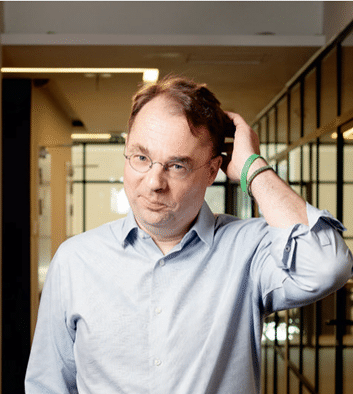From chocolate to holding
Talkative, for sure, but above all authentic and passionate! Three words, among others, for a personality who has made impact the common thread of his life. Benoît de Bruyn, in his happy fifties, has been a nature enthusiast since the age of 6. “I should have been a member of all the Belgian nature protection associations. Every Saturday I got up at 6 a.m. to go birdwatching. When I was 15, I helped the Natural History Museum with the bat census. Benoît de Bruyn is a chemical and bioindustry engineer who specializes in cleantech and finance. He worked for Jan De Nul and La Floridienne, before deciding, at the age of 29, to create his own company. It was to be Newtree, a brand of nutritionally enhanced chocolate products. “We were a pioneer on the fairtrade and the first Belgian carbon neutral food company. The adventure took him, his wife and their four children to San Francisco. “At one point, we were present in almost 5,000 points of sale in the United States. Newtree was caught up by Covid in 2020. This was the springboard for the launch of the holding company Newtree Impact. “Everything I do is for the planet. I’m really sick of seeing the rate at which it’s degrading. Tech, he says, is part of the solution. “But that doesn’t make me a technophile! Acting in a sober way is also important.” P.-F.L.
In April 2020, after eighteen years as a manufacturer and trader of Newtree sustainable and responsible Belgian chocolate, you decided to create the holding company Newtree Impact. Why this change of direction?
On Friday 13 March 2020, nobody has forgotten, the Belgian government banned access to points of sale because of the Covid crisis. Two weeks later, I convened the board of directors of Newtree. I had done all the calculations: we needed at least 1 million dollars to maintain our American team and the first Newtree Coffee outlets we had opened, two of which were in San Francisco and one in Brussels, and this without generating any income for several months. It was mission impossible. At the same Board meeting, I announced that I had decided to create my own investment holding company. Shortly after this board meeting, Raymond Vaxelaire, who was one of the two main shareholders of Newtree, called me to say that he was ready to invest 1 million euros! Another shareholder followed suit. I also had the opportunity to meet Frédéric Pouchain, formerly of CNP and CEO of the Whitestone holding company. With a few other investors, we made a capital increase to launch Newtree Impact.
Why did you choose a holding company rather than a venture capital fund?
It was indeed not the easiest choice. (smile) One explanation is that an investment fund is limited in time. There comes a time when you have to sell your holdings. But I don’t think we can solve the climate crisis in seven or ten years. It’s an illusion. The holding company makes it possible to avoid having to cut off the branches that will enable us to combat the climate crisis. Furthermore, and this is a more personal opinion, I find that the financial structure of the funds is not always in line with the objective pursued. When we set up Newtree Impact, we really wanted to create a climate-focused structure. This means that all the projects we decide to invest in have a climate objective. For each file, we measure, in a very concrete and precise way, the reduction of greenhouse gas emissions, the water saved, the reduction of energy consumption, etc. We therefore base ourselves on metrics that are very important to us. So, we base our measurements on very precise climate metrics. In fact, we don’t even go into the study of a dossier if the company has not set itself the task of developing a concrete solution to combat the climate crisis.
Why target the agri-food sector as a priority?
Some people tend to forget this, but the food sector’s contribution to global warming is considerable. It should be noted that 26% of greenhouse gas emissions are due to the food industry. This is the sector that emits the most, but also the one on which you and I can have an immediate impact by changing the way we eat. I’ll give you three other figures: 70% of global deforestation is linked to agriculture, 40% of agricultural land is used for meat production, 30 to 35% of all arable land is completely degraded. These are facts that show that if we don’t change the entire agri-food chain, we’ll go straight into the wall.
“The food sector is the biggest CO2 emitter, but also the one that you and I can have an immediate impact on by changing the way we eat.”
So Newtree Impact’s mission is to support companies “revolutionizing” the food industry?
That’s our business. Our mission, and this is another reason why we chose the holding company, is to make impact investing accessible to everyone. For example, the young person who starts working and wants to invest 10 euros a month for the climate. Today, they don’t have access to impact investing.
So far, Newtree Impact has raised almost €12 million from private investors. The holding company is therefore not open to everyone…
We have not yet decided on a timetable, but our ambition is to open up to the public by issuing new shares.
What makes Newtree Impact different from holding companies or funds that are managed according to environmental, social and governance (ESG) criteria?
The difference between us and ESG funds is that Newtree Impact has an obligation to achieve results in terms of the fight against global warming. We are not an opportunistic player who will take a little “E”, “S” or “G” with the aim of performing better than others. The companies in which we decide to invest were created to solve problems related to the climate and the environment.
What are your investment criteria?
A particular screening has been determined. In the first phase, we carry out an impact analysis of the company in which we are considering investing. The company must therefore meet impact criteria to be considered. In the second phase, there is more economic and financial screening. In the investments we have made since our launch in 2021, there is one constant: global economic scalability. We will not invest, for example, in a local biogas project. We target companies that are able to scale up their technological innovation globally, simply because we want to have maximum impact.
“Fable Food is our 13th investment.”
Newtree Impact has just made its thirteenth investment in an Australian foodtech company, Fable Food. What does this start-up offer?
Fable Food produces and markets 100% carbon-neutral meat alternatives based on shiitake mushrooms. These mushrooms are rich in fibre and have a unique flavour and texture that is naturally similar to the flavour of meat. Meat is the food with the biggest environmental impact. It alone accounts for more than 50% of the food sector’s CO2 emissions. It is therefore essential to move forward on sustainable alternatives to meat.
You have also announced that you are doubling your stake in Aqua-Spark from 600,000 to 1.2 million euros. Why are you already reinvesting in this Dutch holding company?
This is our very first investment. AquaSpark is a holding company specialised in technological innovation in responsible aquaculture. It brings together more than 300 investors in over 25 countries.
So far, you have not invested in any Belgian foodtech companies. Are you not receiving any good proposals ?
We receive some, but they do not yet meet our investment criteria. Compared to biotech or medtech, the Belgian impact investment ecosystem in foodtech remains marginal. This is a pity because it is an absolute necessity in the context of the transition. Regional players are starting to take an interest, such as Noshaq and IMBC Spinnova (who entered the capital of Newtree Impact in January, editor’s note). Noshaq has also been allowed to invest in Algama, a French company that is going to build its first production unit in Wallonia. Algama specialises in the creation of food ingredients based on microalgae.
“The Belgian ecosystem of impact investing in foodtech remains marginal. It’s a shame.”
Without naming them all, how are the companies in your portfolio innovative?
If you look at Atomo Coffee, a Seattle-based company, they have reinvented coffee through the reuse of food waste. They recover date pits, apricot pits, and grape skins, which they pass through a roasting system. This results in 93% less CO2 emissions. If Atomo manages to take a few percent of the coffee market, the climate impact will be huge. Cubiq Foods, a Spanish company, has created a plant emulsion which, when incorporated into veggie burgers, gives the taste of meat fat. This is a project that we have entered alongside Cargill. Here too, the impact is colossal. EvodiaBio, a Danish company, has developed an innovative flavor blend that is an alternative to hops, a climate-risk crop, in the brewing process of alcohol-free beer. That’s 99% less CO2!
Besides opening the capital of your holding to the public, what are the next steps for Newtree Impact?
In January, we carried out a capital increase of 4.3 million euros, which will enable us to make five or six new investments in the coming months. We are already looking for new investors. We hope to attract one or two reference investors who could help us to move up a category in our future investments.
La Libre Belgique – Saturday 8, Sunday 9, and Monday 10 April 2023
Founder and CEO of Newtree Impact, Benoît De Bruyn
Interview by Pierre-François Lovens


